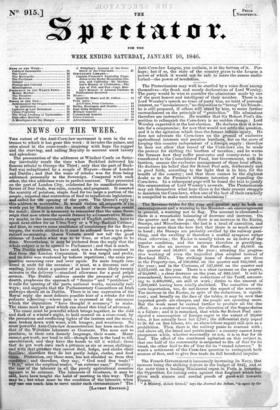NEWS OF THE WEEK.
THE extent of the Anti-Corn-law movement is seen in the ex- tremes to which it has gone this week : it invades the palace, and cries aloud in the cross-roads--inspiring with hope the ragged and the starving, and calling Royalty to account amid luxury
and splendour. .
The presentation of the addresses at Windsor Castle on Satur- day inevitably recals the time when Beckford delivered his famous rebuke to George the Third ; only that the part of Beck- ford was reduplicated by a couple of Mayors—those of London and Dublin ; and that the voice of rebuke was far from being addressed personally to the Sovereign. Compared with each other, the two addresses were in perfect contrast. That presented on the part of London City, celebrated for its manifestations in favour of free trade, was calm, concise, and pregnant. It asserted the scarcity of potatoes, staple food for too large a portion of the people ; imputed that restriction of food to injudicious legislation ; and called for the opening of the ports. The Queen's reply to this address -is noticeable.. It would violate all etiquette if tne words put by Ministers into the mouth of the Sovereign meant too much; since it is necessary to remember that the same Sove- reign that now utters the speech framed by a Conservative Minis- try might, in the inscrutable, changes of English politics, have to speak next either for an Ultra-Tory or a Whig-Radical Cabinet ; and thus, to reserve some semblance of consistency for the Royal tongue, the words allotted to it must be softened down to a gene- ralized no-meaning. Queen Victoria could not tell the good citizens of London what was to be done, or what ought to be done. Nevertheless, it may be gathered from the reply that the whole subject is to be opened to Parliament ; and that is much. The Dublin address, we have said, was a thorough contrast to that from the London Corporation. It was turgid and prolix, and its force was weakened by tedious repetitions ; the same pro- position recurring over and over again. Its mere length ren- dered it unfit for the occasion : it must, at a decorous rate of reading, have taken a quarter of an hour or more likely-twenty minutes in the delivery !—standard allowance for a good pulpit sermon. The Dublin address asserts the presence' of potato dearth, prophesies the approach of " famine " and " pestilence " ; it calls for opening of the ports, national works, especially rail- ways ; and suggests that the Parliamentary Committees on. Irish railways should sit in Dublin. There is in one expression of the Royal reply the most delicate possible hint of a rebuke for this pedantic schooling—where pain is expressed at the statement which the deputation "have thought it necessary" to make. The cause must be good which can stand this kind of advocacy. The cause must be powerful which brings together, in the cold and dark of a winter's night, to hold council on a cross-road, by the precarious and conflicting lights of the lantern and the moon, men broken down with want, with hunger, and weariness. No, more powerful Anti-Corn-law demonstration has been made than that of the Wiltshire labourers at Goatacre. The men met to proclaim, in their own homely language, their wants. Many cannot get work, nor land to till—though there is the land to till, uncultivated, and they have the hands to till it withal : those that do get work earn such a pittance as six or seven shillings; and with that pittance they cannot feed, lodge, and clothe their families.: therefore they do but partly lodge, clothe, and feed
them. Protection, cry these men, has not shielded us from this condition ; and therefore, they say, " God send free trade !" "It is," cries the sceptical reader, ' an extreme case." Possibly : the case of the labourer in all the purely agricultural counties appears to be extreme. The labourers of Goatacre, it may be said, have been taught the habit of meeting in this way. That any one can teach him to meet under such circumstances ? The may be ; but what must be the condition of the labourer, when
Anti-Corn-law League, you exclaim, is at the bottom of it. Per- haps; but if so, the state of the country- gives to the League, a power of which it would not be safe to leave the causes undid- turbed—the power of revolution.


























